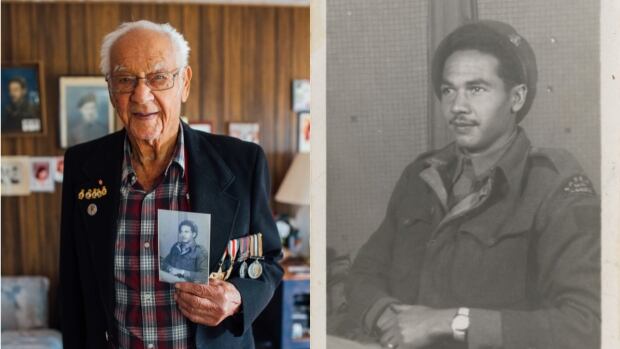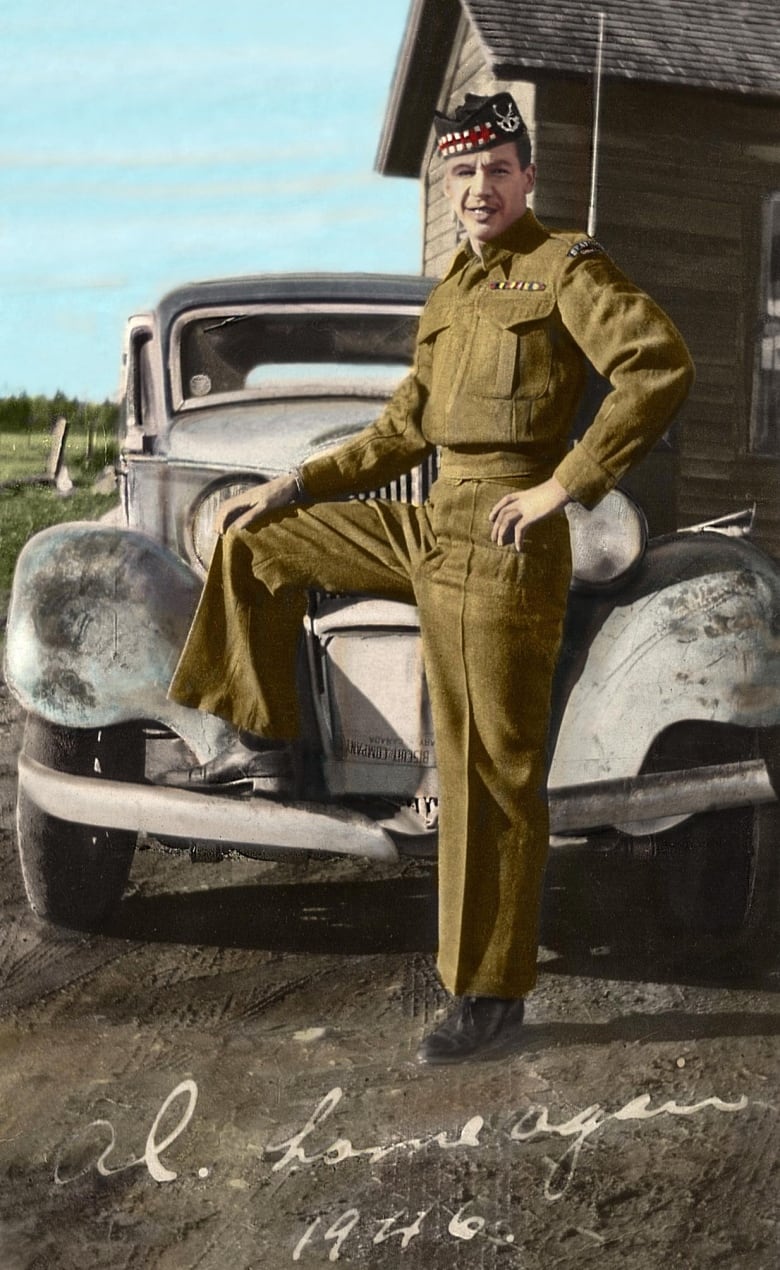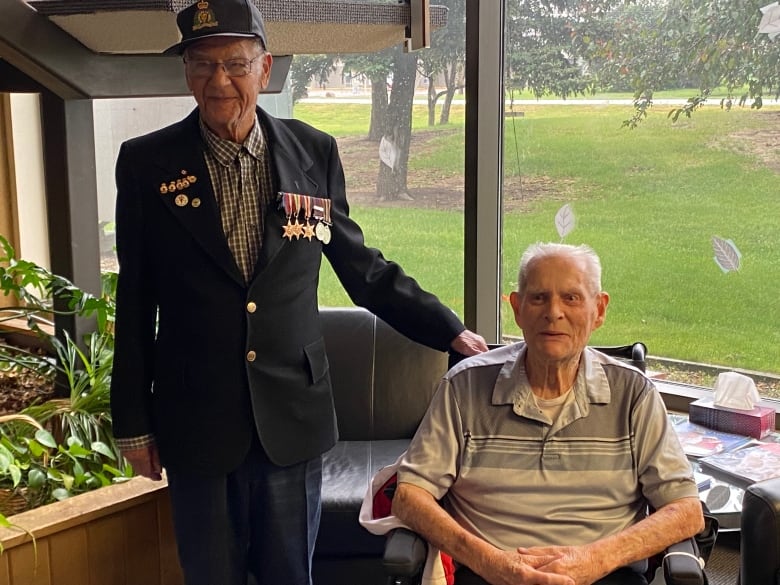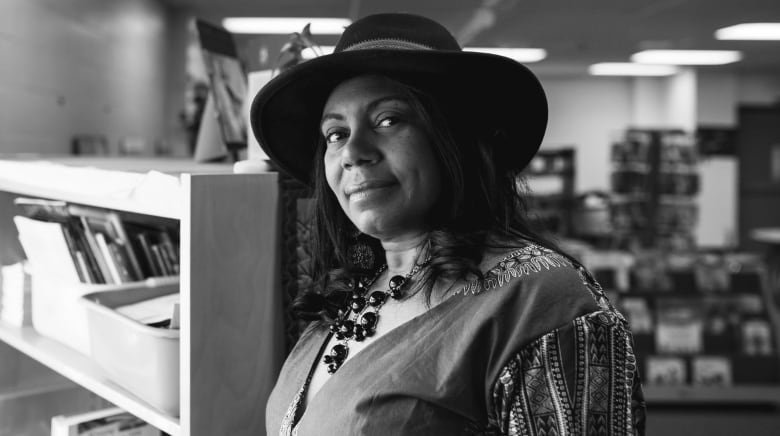
Alvie Burden is one of the last surviving Black Canadian veterans who served in the Second World War. A historian says stories like Burden’s need to be told.
Alvie’s youngest son Kelly sat beside his father in Armstrong, B.C., where Alvie now lives, prompting some of Alvie’s stories and filling in some blanks. The conversation was occasionally punctuated by Alvie’s hearty laughs.
“Don’t ever go back to war, isn’t that what you said before?” Kelly said.
Alvie chuckled. “Yeah. People [have] to learn to get along.”
Alvie was living in B.C. when he joined the Canadian military at 19 years old, but since he was born in Tisdale, Sask., in 1922, he was sent off to the Prairies to join the Saskatoon Light Infantry division as a dispatch rider.

Reuniting with best friend from the military
Alvie was reunited this June with one of his closest friends from the war, Art McKim.
“I met him in Montreal, where we went on the boat to England and then to Sicily,” Alvie said.
The two were in Quebec to train on machine guns. Alvie said they’d go downtown and meet French girls on their off time. He spent a lot of time in England with McKim on guard duty, according to Kelly.
Both friends ended up meeting girlfriends in Paisley, Scotland.
“We met them on the street,” Alvie said.
“You were going to marry one weren’t you?” Kelly asked him.
“Yup.”
Kelly recounted how Alvie gave the woman a ring, but then later changed his mind. She gave the ring back, and it later ended up on the finger of Kelly’s mother.
Alvie and McKim were waiting for a ferry in Sicily when they started “messing around” with gunpowder that had been left on the beach.
“The damn stuff went up in smoke,” Alvie said. “Art, he had his eyes all full of sand.”
McKim was temporarily blinded. Alvie had to lead him out of the area and help him to the hospital. It was the last time the men saw each other for decades.

Alvie spent years looking for McKim, even driving to where he thought Art was from.
They were finally able to track him down.
“It was a pretty big deal,” Alvie said.
They didn’t find out until they reunited that McKim’s half-brother lived within an hour drive of Alvie, and his relatives played hockey with Kelly’s son.
Injured in war
Alvie was driving over a ridge when an enemy tank shell landed behind him and sent him flying into the air.
According to Kelly, an allied tank straddled him to protect him as soldiers pulled him to safety.
He ended up with shrapnel in his head and wrists, and the embedded lead continued to fester.
Despite that, Alvie returned and started carrying machine guns on a half-track as the driver of a Bren gun carrier.
Black Canadian stories important to remember
Kathy Grant founded the website and Facebook page Black Canadian Veterans Stories as part of a promise to her father, a Second World War veteran, to honour the contributions of Canada’s Black soldiers.
Since then, dozens of stories from Black veterans of various wars have been posted online.
Grant said she’s been in situations where Black Canadians have been conflicted on Remembrance Day, asking what they had to celebrate. She would show them stories and pictures.
“We served,” Grant said. “By putting these examples and showing we served … [even] after the war, it humanizes the soldiers by showing examples of us and not only showing examples of victims of racism.”
Grant said there were about 1,300 Black Canadians who either enlisted or were conscripted to the military in the First World War, but in the early stages many were turned away by the commanding officer, who had the final say.
“There were hundreds that were turned away because of the commanding officer, but not because of policy,” she said.

Things changed in the Second World War, and while some commanders still turned away applicants, Black Canadians joined the military much more easily.
“The majority of Black World War II veterans that I’ve interviewed indicated the racism … wasn’t rampant, it was the odd occasion,” she said.
“The racism that they would experience would be when they returned home from overseas, or also when they were stationed in certain towns during training, when they would go into bars or dancing or whatever.”
She said her father was kicked out of a bar in Edmonton because of his skin colour, even though he was in uniform.
Grant believes Alvie is among fewer than five living Black Canadian Second World War veterans in the country.
While Alvie’s uncle, Roy Burden, was in a segregated unit in the United States, Alvie said that during his time in the military, from 1941 until the end of the war in 1945, he didn’t face race-related issues despite being the only Black Canadian in his company.
It was “all right, no problems,” he said.
For more stories about the experiences of Black Canadians — from anti-Black racism to success stories within the Black community — check out Being Black in Canada, a CBC project Black Canadians can be proud of. You can read more stories here.
